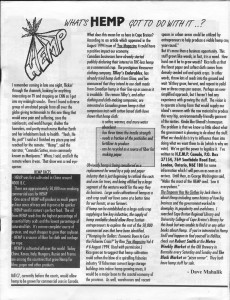 I remember coming in late one night, flickin’ through the channels, looking for anything interesting on TV and stopping on CNN as I got in my midnight snacks. There I found a diverse group of unrelated people from all over the globe giving testimonials to this one thing that would ease pain and suffering, save the rainforests, end world hunger, shelter the homeless and pretty much nurse Mother Earth and her inhabitants back to health.
I remember coming in late one night, flickin’ through the channels, looking for anything interesting on TV and stopping on CNN as I got in my midnight snacks. There I found a diverse group of unrelated people from all over the globe giving testimonials to this one thing that would ease pain and suffering, save the rainforests, end world hunger, shelter the homeless and pretty much nurse Mother Earth and her inhabitants back to health.
“Yeah, he he he, pot!” I said as I finished my Pizza Pop and reached for the remote.
“Hemp,” said the narrator. “Cannabis Sativa, more commonly known as Marijuana”.
Whoa, I said, and left the remote where it was. That show was a real eye-opener.
HEMP FACTS:
– HEMP was first cultivated in China around 4000 BC.
– There are approximately 50,000 non-smoking commercial uses for HEMP.
– One acre of HEMP will produce as much paper as four acres of trees and it grows a lot quicker.
– HEMP seed is nature’s perfect food. The oil from HEMP seeds has the highest percentage of essential fatty acids and the lowest percentage of saturated fats. It’s a more complete source of protein, and much cheaper to grow, than soybean.
– HEMP is a source of fibre for cloth and cordage for rope.
– HEMP is cultivated all over the world. Today China, Korea, Italy, Hungary, Russia and France are among the countries that grow hemp for fibre, paper and other products.
Bill C7, currently before the courts, would allow hemp to be grown for commercial uses in Canada. What does this mean for us here in Cape Breton? According to an article which appeared in ‘Fax Magazine it could have a positive impact on our economy.
“Canadian businesses have already started publicly declaring their interest in THC-less hemp as a commercial crop. The prestigious Vancouver clothing company, Tilly’s Endurables, has already tried hemp cloth from China, and has announced that they intend to use cloth made from Canadian hemp in their line-up as soon as it is available. The reason Tilley’s, and other clothing and cloth making companies, are interested in Canadian-grown hemp is that comparison tests with cotton based cloth have shown that hemp cloth is softer, warmer and more water absorbent; has three times the tensile strength; needs a fraction of the pesticides and fertilizer to produce; and can be recycled as a source of fibre for making paper.
“Obviously hemp is being considered as a replacement for wood by a pulp and paper industry that is just beginning to rethink the costs and uses for trees, and being vilified by a large segment of the western world for the way they do business. Large scale cultivation of hemp as a cash crop could not have come at a better time for our forests, or our farmers.
“If hemp can be established as a large-scale crop supplying a few key industries, the supply of hemp available should allow Nova Scotian entrepreneurs to explore the rest of the 50,000 commercial uses that have been identified.” (“Hemping for Dollars: Economic Boon to Cure the Fisheries Crisis?” by Rico, ‘Fax Magazine Volume 4, Number 6, August 1994. Used with permission)
Rico goes on to suggest that hemp cultivation could soften the blow of a spiraling fisheries industry “if fishermen convert large storage buildings into indoor hemp growing areas, it would be a major boon to the coastal economy of the province. As well, warehouses and vacant spaces in urban areas could be utilized by entrepreneurs to help produce a viable hemp crop year-round.”
But it’s more than a business opportunity. This stuff grows like weeds, in fact, it is a weed. How hard can it be to grow weeds? Rico tells us that the finest paper and softest cloth comes from densely seeded soil and quick crops. In other words, throw lots of seeds into the ground and wait ‘til they grow, harvest and repeat to yield two or three crops per season. Perhaps an oversimplified approach, but I haven’t had any experience with growing the stuff. The vision is to operate a hemp farm that would supply our island’s weavers with the raw material to produce this very hip, environmentally-friendly garment of the nineties. Kinda like Ghandi’s homespun. The problem is that we know so little about what the government is planning to do about the stuff. What we should do is try to influence them into doing what we want them to do (which is why vote). We’ve got the power to legalize it. I’ve written to H.E.M.P. Canada, PO Box 37154, 769 Southdale Road East, London, Ontario, N6E 1B0 for some information which I will pass on as soon as it arrives. Until then, as George Washington said, “Make the most of the hemp seed. Sow it everywhere.”
The Emperor Has No Clothes, by Jack Hare, is about hemp including some history of how big business and the government worked to downplay its popularity and usefulness. I searched the Cape Breton Regional Library and University College of Cape Breton’s library for this book but was unable to find it or any other book about hemp. If you are interested in hemp stuff and happen to find yourself in Halifax, check out Robert Smith at the Metro Weekly Market at the Old Brewery in Burnside every Saturday and Sunday and the Black Market on “pizza corner”, They both have hemp stuff for sale.

